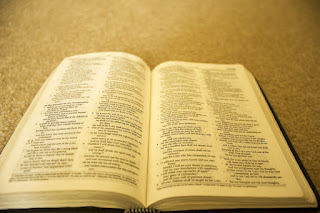The reader can imagine then how nervous I felt as I began sharing that aspect of being Calvinistic and charismatic. I briefly touched on all five points and some of the Scriptural support for them. I couldn't go really in-depth because time was limited, but I really do think that I faithfully represented the Calvinistic view of election and predestination and how such are taught in Scripture. Dad listened attentively and I noticed him taking notes (He had a copy of the presentation that I had made).
One thing that became apparent was how heavily I relied on John 6:44. Indeed, I referenced it as a proof-text for four of the five points (the exception being Limited Atonement, but that doctrine is put forth elsewhere in Scripture). John 6:44 says this:
No one can come to Me unless the Father who sent Me draws him; and I will raise him up on the last day. NASB
I noted that Jesus clearly says that the only way a person can come to Him is if that person is drawn by the Father. Every one of those who are drawn by the Father come to Jesus and are "raised up on the last day", which is clearly a reference to final salvation from sin. Since it is clear that not all persons everywhere at every time will be raised up on the last day, it is also clear that not all are drawn by the Father. Thus the drawing by the Father is particular and sovereign since it takes this drawing to come to Jesus. Human beings lack the capacity to come to Jesus on their own.
At the end, my dad asked me how I, as a Calvinist, reconcile my understanding of John 6:44 with what Christ says later in John's Gospel in 12:32:
And I, if I am lifted up from the earth, will draw all men to Myself. NASB
It is evident here that all men will be drawn to Jesus in this text, and not only a particular group as 6:44 claims, says dad. How do I reconcile my Calvinistic convictions in the light of this text? What follows is a summary of how I answered my dad's question and what I understand Jesus to say in John 12:32 and how it happily accords with what He earlier said in 6:44.
In a nutshell, I noted two things about both texts by way of contrast. Firstly, In 6:44 it is God the Father doing the drawing. In 12:32, it is God the Son - Jesus Christ who does the drawing. Now it is possible that I am overstating this difference, but I do not think so because of my next point. In the context of 12:32, we find that Jesus has entered Jerusalem on Palm Sunday and after He had entered, we are introduced to some Greeks, presumably God-fearers who had come to worship at the Passover feast. The text of John 12 picks up the story:
Now there were some Greeks among those who were going up to worship at the feast; these then came to Philip, who was from Bethsaida of Galilee, and began to ask him, saying, “Sir, we wish to see Jesus.” Philip came and told Andrew; Andrew and Philip came and told Jesus. And Jesus answered them, saying, “The hour has come for the Son of Man to be glorified. Truly, truly, I say to you, unless a grain of wheat falls into the earth and dies, it remains alone; but if it dies, it bears much fruit. He who loves his life loses it, and he who hates his life in this world will keep it to life eternal. If anyone serves Me, he must follow Me; and where I am, there My servant will be also; if anyone serves Me, the Father will honor him.
“Now My soul has become troubled; and what shall I say, ‘Father, save Me from this hour’? But for this purpose I came to this hour. Father, glorify Your name.” Then a voice came out of heaven: “I have both glorified it, and will glorify it again.” So the crowd of people who stood by and heard it were saying that it had thundered; others were saying, “An angel has spoken to Him.” Jesus answered and said, “This voice has not come for My sake, but for your sakes. Now judgment is upon this world; now the ruler of this world will be cast out. And I, if I am lifted up from the earth, will draw all men to Myself.” John 12:20-32 NASB
Christ is answering the request of the Greeks to Philip and Andrew to see Jesus. Jesus reveals that His hour has come when He is to die. By His death, like a grain of wheat, He will reap a bountiful harvest of souls for His Kingdom. However, like elsewhere in John's Gospel, Jesus is not going to die for the people of Israel alone, but also for the gentiles, including Greeks, so as to gather them together into one (see also John 11:49-52). I conclude then that when Jesus says He will draw all men to Himself, that He means that He, by His death, will draw men, women, and children from all nations to Himself. This perfectly accords with Jesus' earlier statement that only those drawn by the Father can come to Him, and thus be finally saved and raised up on the last day.


No comments:
Post a Comment